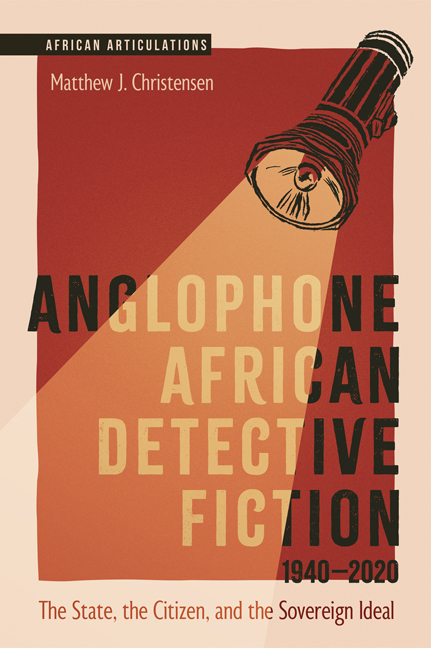Book contents
- Frontmatter
- Dedication
- Contents
- List of Illustrations
- Acknowledgements
- Introduction
- Part 1 Africanizing Detective Fiction’s Un/Sovereign Subjects
- Part 2 Neoliberal Noir
- Conclusion: The Future Imperfect
- An Anglophone African Detective Fiction Bibliography, 1940–2023
- Bibliography
- Index
- Miscellaneous Endmatter
2 - Sovereign States: Police Investigators, Secret Agents, and Sleuthing Citizens after Independence
Published online by Cambridge University Press: 11 May 2024
- Frontmatter
- Dedication
- Contents
- List of Illustrations
- Acknowledgements
- Introduction
- Part 1 Africanizing Detective Fiction’s Un/Sovereign Subjects
- Part 2 Neoliberal Noir
- Conclusion: The Future Imperfect
- An Anglophone African Detective Fiction Bibliography, 1940–2023
- Bibliography
- Index
- Miscellaneous Endmatter
Summary
In 1960, the prolific Ghanaian fiction writer Gilbert A. Sam self-published what is possibly the first Anglophone detective story to appear in print in a politically independent African nation-state. The novella, Who Killed Inspector Kwasi Minta?, is set in Accra in the late 1940s and traces the police inquiry into the murder of a fellow police investigator. Tasked with the case, Sergeants Oduro and Ahia pursue the investigation with little fanfare and a great deal of the drudgery that defines routine criminal detection in both the police procedural and real life. Sam's cops are never less than methodical, practicing what Sergeant Oduro describes proudly as ‘practical criminology’ (9). The novella's main plot twist comes when Minta's love interest Georgina beats the cops to the big reveal, eliciting the killer's confession while the police can merely listen from the wings, present only to make the formal arrest. From the moment of Oduro and Ahia's introduction, however, there is never a question that with or without Georgina's private sleuthing they will prevail over the killer. Set as it is during the colonial era, Sam misses no opportunity for his African protagonists to show up their white British superiors, demonstrating again and again Ghana's superior claim to self-government. Even the plot resolution, with the private citizen dedicating herself to the public good, suggests the primacy of popular sovereignty for effective and democratic governance. For its post-independence readership Who Killed Kwasi Minta? dramatizes the socially beneficent power of a civicminded citizenry working in tandem with an equally civic-minded African police force. In every respect, Sam's vision of the state as a guarantor of the rights and protections of citizenship contrasts radically with the assessment of state power laid out in the colonial-era texts encountered in the previous chapter.
As it would turn out, in Nigeria, too, the first detective story to appear after independence, Cyprian Ekwensi's Yaba Round-about Murder (1962), was a police procedural with a similarly salutary vision for the state. Other West African writers would follow, steadily producing police investigation narratives throughout the 1960s and early 1970s. The announcement of fully participatory democracy in South Africa in 1990 ushered in the quick publication of two Black South African-authored police investigation novels there as well.
- Type
- Chapter
- Information
- Anglophone African Detective Fiction 1940-2020The State, the Citizen, and the Sovereign Ideal, pp. 59 - 92Publisher: Boydell & BrewerPrint publication year: 2024



